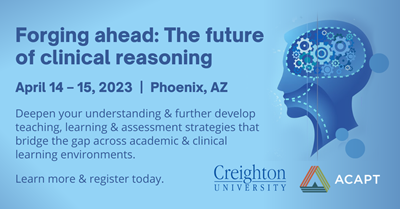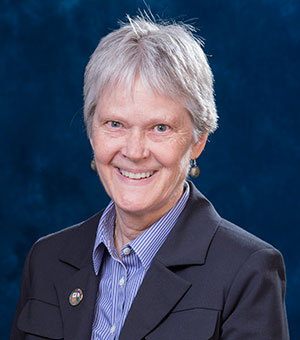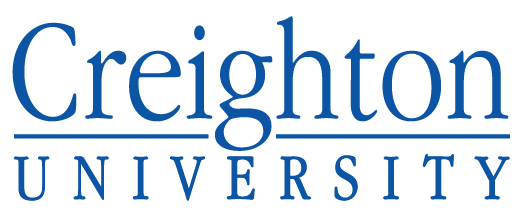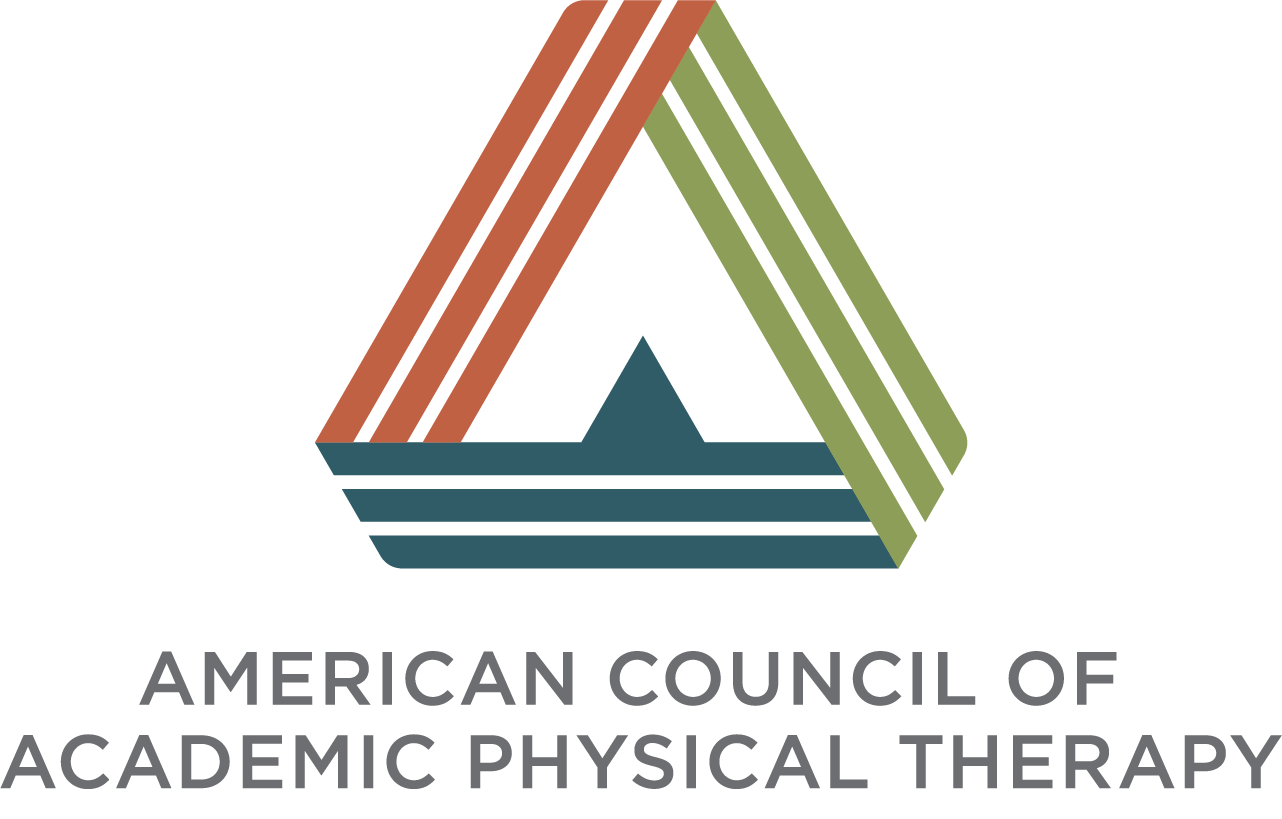Forging ahead: The future of clinical reasoning
When:
Phoenix, AZ
Creighton University Health Sciences Campus

The complexities and challenges inherent in the teaching and learning of clinical reasoning are encountered by all physical therapist educators, whether working with:
- students in the classroom and clinical settings,
- residents and fellows in post-professional programs or
- colleagues across health professions.
This symposium is designed to deepen your understanding and further develop teaching, learning, and assessment strategies that bridge the gap across academic and clinical learning environments.
Who should attend
- Academic and clinical faculty
- Site coordinators of clinical education (SCCEs)
- Clinical instructors
- Directors of clinical education (DCEs)
- Residency & fellowship directors
- Mentors
- Residents/Fellows
Maximum enrollment is 75 participants.
- Participants with prior experience mentoring/teaching professional students in a clinical setting, (entry level, residency or fellowship), or in an academic setting are highly desired.
Please do not make travel arrangements until you receive confirmation of registration.
Objectives
- Explore clinical reasoning as a competency in professional and post-professional education and reflect on the potential roles of different stakeholders in this innovative educational model.
- Identify evidence-based teaching and learning activities to assess, facilitate or remediate clinical reasoning abilities for professional and post-professional education.
- Describe how knowledge translation frameworks traditionally utilized to advance clinical practice may be applied to best practices in teaching and learning clinical reasoning in PT education.
- Build collaborations between educators across the continuum of PT education to support research in clinical reasoning and redesign/construct innovative training models for supporting clinical reasoning as a competency in professional
and post-professional education.
- Compare and contrast common barriers, facilitators, and strategies to implementing best practices in teaching and learning for clinical reasoning.
- Formulate a plan to engage in the knowledge translation process and elevate the teaching and learning of clinical reasoning within their respective educational settings.
Register to attend the symposium here
Keynote Speakers
KEYNOTE SPEAKER: Gail Jensen, PT, PhD
 Dr. Jensen is Vice Provost for Learning and Assessment, Dean Emerita, and Professor of Physical Therapy at Creighton University. She is known nationally and internationally for scholarly contributions in expert practice,
clinical reasoning, professional ethics, and interprofessional education.
Dr. Jensen is Vice Provost for Learning and Assessment, Dean Emerita, and Professor of Physical Therapy at Creighton University. She is known nationally and internationally for scholarly contributions in expert practice,
clinical reasoning, professional ethics, and interprofessional education.
Dr. Jensen is author or coauthor of more than 90 publications in peer-reviewed journals and has coauthored 13 books, including the fourth edition of Clinical Reasoning in the Health Professions (Higgs, Jensen, Loftus, Christensen), Educating Physical
Therapists, and in 2020, Clinical Reasoning and Decision Making in Physical Therapy. She led the research team that completed a National Study of Excellence and Innovation in Physical Therapist Education funded by the American Physical Therapy
Association and several APTA components. She serves on a number of editorial boards and most recently became an associate editor for The Clinical Teacher.
Dr. Jensen received her PhD in educational evaluation with a minor in sociology from Stanford University. She holds a master’s degree in physical therapy from Stanford University and a bachelor’s degree in education from the University of
Minnesota.
KEYNOTE SPEAKER (virtual presentation): Joseph J. Rencic, MD
 Dr. Rencic received his BS at Georgetown University and his MD at the University of Pennsylvania School of Medicine. He completed his residency and chief residency in internal medicine at the Hospital of the University of
Pennsylvania. He is a Professor of Medicine at Boston University and a hospitalist in the Division of General Internal Medicine.
Dr. Rencic received his BS at Georgetown University and his MD at the University of Pennsylvania School of Medicine. He completed his residency and chief residency in internal medicine at the Hospital of the University of
Pennsylvania. He is a Professor of Medicine at Boston University and a hospitalist in the Division of General Internal Medicine.
Dr. Rencic’s research seeks to improve health professionals’ clinical reasoning and enhance their
diagnostic accuracy and treatment decisions, with the ultimate goal of reducing medical errors and improving patient outcomes. He has developed and disseminated theory-based strategies for how to effectively teach and evaluate clinical reasoning through
curricula, assessment methods, journal publications, and a book, “Teaching Clinical Reasoning.” His multiple peer-reviewed publications in clinical reasoning have challenged existing constructs, proposed a new conceptual framework, provided
a seminal reference for its assessment, highlighted the inadequacy of clinical reasoning curricula in U.S. medical schools, and developed the first set of interprofessional competencies in diagnosis.
In addition to his research, Dr. Rencic
is the Director of Clinical Reasoning Education, the co-course Director of Doctoring 2, and a member of the Academy of Medical Educators at the Boston University School of Medicine. He also serves as Acting Internship Director for the fourth-year
internal medicine rotation at Boston Medical Center. These positions align with his strong professional interests in medical education, curriculum design, assessment, competency, and mentoring.
Dr. Rencic has been actively involved in the
Alliance for Academic Internal Medicine, serving as councilor for the Clerkship Director of Internal Medicine, as well as the Society for Improved Diagnosis in Medicine.
Course coordinators: L Black, J Furze, H Knight, G Jensen, K Somers, C Sebelski
Planned Schedule
Friday, April 14, 2023
| 12:30 – 1:00 pm |
Registration |
| 1:00 – 2:00 pm |
Keynote: Gail Jensen, PT, PhD |
| 2:00 – 3:00 pm |
Session #1 – Foundational concepts in the learning sciences
Speaker: Gail Jensen, PT, PhD
|
| 3:00 – 3:15 pm |
Break |
| 3:15 – 5:00 pm |
Session #2 – Knowledge translation concepts/application
Panel discussion |
| 5:00 – 7:00 pm |
Reception/poster presentations |
Saturday, April 15, 2023
| 8:00 – 9:00 am |
Developing a clinical reasoning curriculum for faculty challenges |
| 9:00 – 10:00 am |
Session #3 - Panel discussion |
| 10:00 – 10:15 am |
Break |
| 10:15 – 12:00 pm |
Session #4 – Assessing & Facilitating CR across a continuum and remediating clinical reasoning
Small group discussion panel |
| 12:00 – 1:00 pm |
Lunch – Boxed lunch |
| 1:00 – 2:45 pm |
Session #5– Current research in CR – where we are
Small group discussions |
| 2:45 – 3:00 pm |
Break |
| 3:00 – 4:45 pm |
Session #6 – Moving forward from here
|
| 4:45 – 5:00 pm |
Summary and program evaluation |
Register to attend the symposium here.
Call for Poster Abstracts
The poster presentations are intended to facilitate the dissemination of current research occurring in the fields of clinical reasoning and/or scholarship of teaching and learning across the continuum of physical therapy education.
We will consider a variety of abstract types including:
- Case studies
- Research
- Special interest and/or theoretical reports
Current works in progress for professional/entry-level and residency/fellowship education are strongly encouraged to submit for review.
Peer review process: A Clinical Reasoning Symposium Poster Review Committee, whose decisions are final, make the determination of acceptance/non-acceptance.
- Abstract submissions are accepted through March 1, 2023.
- Email notification will be provided to the primary author regarding the status of the abstract by March 14, 2023.
- All presenters of accepted posters are required to register and pay the full conference registration fee.
- Presenters are expected to engage in discussion of their posters for a minimum of one hour during the conference. Schedule to be determined upon acceptance of the poster presenters.
Categories for submission
To guide your submission, authors should submit abstracts under one of the categories listed below. Submissions will be accepted for educational research across all levels of physical therapy education.
- Assessment of clinical reasoning: Innovative and/or effective methods for testing and measuring a learner’s clinical reasoning skills.
- Facilitating clinical reasoning: Innovative and/or effective strategies for facilitating clinical reasoning skills in the classroom and in the clinical practice environment.
- Remediation of clinical reasoning: Innovative and/or effective techniques for assisting in the remediation of clinical reasoning skills when a learner is not progressing as expected.
- Scholarship of teaching & learning for clinical reasoning: Innovative and/or effective teaching and learning for the student, resident and/or fellow.
Submit your poster abstract here.
The Symposium is co-sponsored by Creighton University and the American Council of Academic Physical Therapy (ACAPT)

